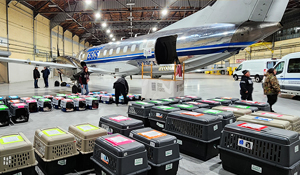5 Steps to Help Your Dog Feel Safe During a Storm

Why Do Dogs Get Anxious During Storms?
Dogs experience thunderstorms differently from humans. Their sensitive hearing, heightened sense of smell, and ability to detect changes in barometric pressure make them more aware—and more affected—by storm activity.
Common triggers include:
- Loud thunderclaps or wind gusts
- Flashing lightning
- Static electricity buildup
- Atmospheric pressure changes
- Past traumatic experiences (such as being outside or alone during a storm)
How to Calm a Dog During a Storm: 5 Evidence-Based Strategies

1) Create a Safe, Quiet Space
Choose a room in your home that’s insulated from sound—like a closet, bathroom, or basement. Add soft bedding, favorite toys, and treats to create a calming, familiar space. If your dog prefers a crate, make it cozy and leave the door open. Covering it with a blanket can help muffle outside noise and block out lightning flashes.
2) Be present, and stay calm
Your dog looks to you for cues. If you stay calm and grounded, your presence can provide essential reassurance. Speak in low, soothing tones. Pet them gently. If they’re receptive, engage them in a simple activity like indoor fetch or puzzle toys. Avoid reinforcing fear, but don’t ignore their distress—support them with consistency and patience.
3) use white noise, or calming music
Drown out the storm with white noise machines, calming playlists designed for dogs, or ambient sounds like rainfall or soft classical music. This helps mask sudden noises and reduce stress. Try out different soundscapes in advance to see what works best for your pet.
4) Apply gentle pressure
Many dogs respond well to gentle pressure on their body, which can have a calming effect similar to swaddling a baby. A snug anxiety wrap or pet-safe compression shirt may help soothe them. In a pinch, you can gently wrap your dog in a towel or use an anti-static dryer sheet (unscented and pet-safe) to reduce discomfort caused by electrical charge.
5) train with desensitization over time
Long-term behavior change is possible. Introduce your dog to the sound of thunderstorms in a controlled way by playing recordings at very low volume. Pair the sound with treats, praise, or playtime. Gradually increase the volume over several weeks. This type of desensitization training helps dogs form new, more positive associations with storm sounds.
How to Keep a Pet Safe During a Storm
- Never leave pets outside during a thunderstorm. Frightened animals may run away or injure themselves trying to escape.
- Close windows and doors to reduce noise and prevent escape.
- Update ID tags and microchips in case your pet bolts and gets lost.
- Stay indoors with your pet, especially if storms bring severe weather warnings.
If your dog’s storm anxiety is severe, consult your veterinarian. In some cases, a vet may recommend anxiety-reducing medications or refer you to a veterinary behaviorist.

Helping Dogs with Storm Anxiety Starts with Understanding
Storm anxiety in dogs is common, but not permanent. With preparation, patience, and consistency, you can help your pet feel safer during storms and build their confidence for the long term.
At Greater Good Charities, we support the well-being of animals and the people who care for them. Whether through access to medical care, emergency response, or behavioral support, our goal is to strengthen the bond between pets and their families, no matter the weather.


